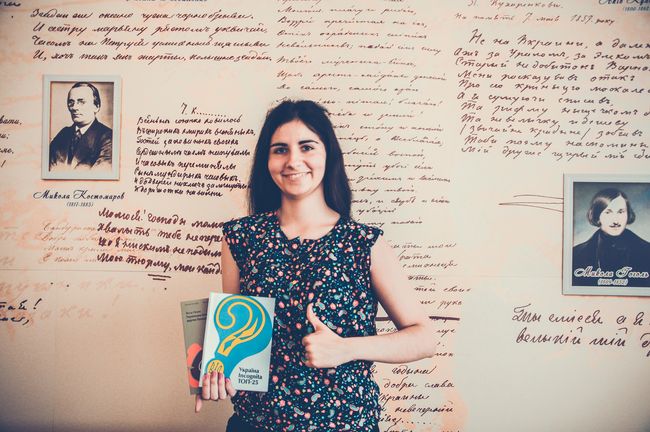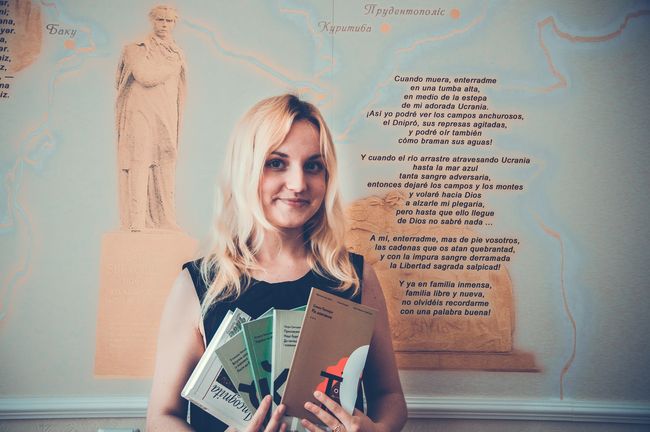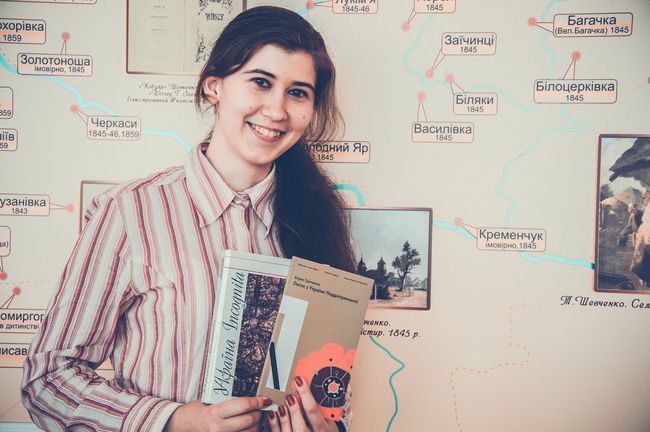“It is interesting to learn with Den”
An inspiring story of how a not indifferent teacher revealed the world of our newspaper to her students
The Drahomanov National Pedagogical University joined Den’s flash mob. It will be reminded that everyone willing makes videos of himself/herself reading extracts from the books from our Library. The students held a seminar, where they discussed the educational and cultural values of Ukraine, as viewed by the newspaper Den. The youth told about its favorite publications from our library. The students shared their impressions from the newspaper, the glossy supplement, and even the advertisement banners “Breaking the Spell” on transport stops. Den talked to the initiator of this event, Ph.D. in Philosophy, associate professor of the department of cultural studies of the Institute of Philosophical Education and Science of the Drahomanov National Pedagogical University Svitlana KHRYPKO.
“THE YOUTH WAS CAPTIVATED BY THE SCALE OF DEN’S PROJECTS”
“Within the framework of the course ‘Ukrainian and World Culture,’ which I teach, I suggested consulting the books from Den’s Library on certain topics. This is how the students learned about this project. Then I offered to arrange a seminar, where we would discuss the educational and culture values of Ukraine on the pages of the newspaper Den,” Svitlana started the conversation. “The students were captivated by this idea. The class was very unrestrained, easy, and interesting. The students shared before the camera the impressions they received from the books from Den’s Library, they presented their favorite publications. They liked Ukraine Incognita. TOP 25 the most, and the books from the collections ‘Armor-Piercing Political Writing’ and ‘Subversive Literature’ were received very warmly.
“Some students didn’t know the newspaper Den, till I told them about it. That was nonsense for me, but it’s good that they have discovered it. The youth was surprised that Ukraine had such a good project, and they didn’t know anything about it. The students were captivated by the website of the publication, the scale of Den’s ‘Tree of Knowledge.’ Incidentally, the students took interest in the idea of Den’s Summer School of Journalism. I think many more will join it.”
How can present-day students be encouraged to learn?
“I am personally guided by one criterion: it should be interesting both for them, and for me. I don’t have a standard seminar plan. There are certain topics, an approximate list of questions, additional literature, and at the same time I allow them to prepare some interesting things, so that the reports were not static. At the seminar we somewhat step aside from the textbook and information that is common knowledge.
“So, within the framework of Ukrainian and world literature I teach the students to orient themselves in native and foreign things. The old-time layers of various cultures are closely intertwined, they are often similar. Without knowing certain elements of Ukrainian culture it is hard to understand something in Japanese culture. They go in layers, which is why it is good to compare different historical periods in Ukraine and other countries. For example, what was in Ukraine, when there was inquisition in Europe? What was going on in Europe, when some important events took place in Ukraine? In this angle certain interesting moments emerge.
“Or the Scythian culture, for example. We can tell a lot about the Scythians, their folkways and traditions. But let’s have a look at Europe of that time. There was the powerful Roman Empire. And the territory of Scythia wasn’t a part of this state. Rome conquered everything, except for the territory of present-day Ukraine. The word Scythians is mentioned in the Bible. If we dig deep enough, we can find many interesting things.”
“I SEND ALL OF MY STUDENTS TO SOPHIA OF KYIV”
Which subject is your favorite?
“I have many special courses, including the history of Ukrainian culture, its semantics, and study of religion. But ethnic cultural studies are my favorite course. I very much like the ethnic cultures and the spiritual layer of the traditional Ukrainian culture. I add these topics to everything I teach. The semantics of the words, symbols, figurative language, non-verbal communication – this is captivating, and in these moments various cultures are very close.”
What culture monuments do you recommend the youth to watch?
“I send everyone to Sophia of Kyiv. It turns out that many students who are not from Kyiv don’t know what it is and where it is located. Yes, sometimes the students don’t know even the most famous places like Mariinsky Park. At first they should learn some elementary things, then visit various museums, for example, Bohdan and Varvara Khanenko Museum.”

ANASTASIA MANULINA: “I LIKED YEAR OF SILENCE BY SYMON PETLIURA FROM THE COLLECTION ‘ARMOR-PIERCING POLITICAL WRITING.’ THE BOOK MAKES US THINK OF WHO WE WERE AND WHO WE WILL BE IN THE FUTURE”
How have your students changed over the past five years?
“Our educational establishment is humanitarian, mostly girls are studying here. It is pleasant for me to work with them. This is a warm and gentle audience. When I only started to work as a teacher, nearly 20 years ago in another university, students were somewhat angry. Now many students are patriotic and kind. They surf the Internet, don’t read books much. For them the fact that they started to read the paper books of Den became a surprise.
Reviews of Den’s books by the students of Andrii Malyshko Institute of Ukrainian Philology of the Drahomanov National Pedagogical University.
“A POSSIBILITY TO UNDERSTAND TO SOME EXTENT WHAT WE ARE DOING WRONG”
Kateryna HARMASH: “I learned about the newspaper Den/The Day recently and I regret that I haven’t done this earlier. This is not just a newspaper that publishes the facts. This is a modern look from the past into the future. There is interesting, useful, and actual information both for the youth, and the senior population.
“The rich content is impressive: news, exhibitions, opinions of various people, but I was the most interested in the Library of the newspaper Den/The Day, in particular, the series ‘Subversive Literature’ and ‘Armor-Piercing Political Writing.’ Several books immediately drew my attention, even with their titles, such as Little Russian. Sketches on History of Our Culture by Yevhen Malaniuk and Diary by Taras Shevchenko. Small books, available prices, and the idea to publish namely these works is what present-day Ukraine needs now. It’s a possibility to hear famous personalities, to compare their contemplations with your present-day reality and find out how actual the thoughts of people who lived long ago before us are. This is a possibility to understand to some extent what we are doing wrong, where we took a wrong turn, and how to go back to the right way. This is a possibility to get to know life, which is unknown to youth, and make examples of our own.
“I’m thankful to everyone who works on these projects. And I will gladly reread these books with a pencil.”
“IF AT SCHOOL THE TEACHERS RECOMMENDED US TO READ THE BOOK UKRAINE INCOGNITA, THE INTEREST TO STUDYING THE WORK OF WRITERS AND HISTORICAL FIGURES WOULD HAVE GROWN THREE TIMES”
Svitlana HRYHORIEVA: “I like Letters from Naddniprianska Ukraine by Borys Hrinchenko, published in the series ‘Subversive Literature.’ It is impressive how true Borys Hrinchenko’s words are, ‘Everyone feels sad when he looks at Ukraine.’ It seems that he addresses Ukraine of the 21st century. In Letters from Naddniprianska Ukraine one can see a lot of things connected with our present-day reality. Hrinchenko writes about relying on ourselves, which is a sad resume of the state our fatherland has found itself: ‘Ukrainians have to rely exclusively on themselves.’ The Letters from Naddniprianska Ukraine is interesting for present-day readers.

SVITLANA HRYHORIEVA: “I LIKE LETTERS FROM NADDNIPRIANSKA UKRAINE BY BORYS HRINCHENKO, PUBLISHED IN THE SERIES ‘SUBVERSIVE LITERATURE.’ IT IS IMPRESSIVE HOW TRUE BORYS HRINCHENKO’S WORDS ARE, ‘EVERYONE FEELS SAD WHEN HE LOOKS AT UKRAINE.’ IT SEEMS THAT HE ADDRESSES UKRAINE OF THE 21st CENTURY”
“If I and my classmates at school were recommended by teachers of Ukrainian literature and history to read the book Ukraine Incognita, besides the textbooks, the interest to studying the creative work of the writers and historical figures would have grown three times for sure, in such a creative and interesting way the main facts from the history of Ukraine, the facts about its outstanding sons and daughters, from antique times to this day are presented there. I liked the thematic titles of the chapters: ‘Young ages of the nation. Princely time,’ ‘Dark Ages: the Horde, Lithuania,’ ‘Back in the time we were Cossacks,’ etc. I also took interest in the topics of specific materials: ‘Sophia of Kyiv. The effect of the high sky,’ ‘Master and city (Kyiv and Bulgakov),’ ‘Prophet won’t be heard at his own land.’ This book is extremely interesting, because, apart from the non-standard narration, you can read certain documents, facts from history, and thematic illustration.
“The book has a convenient format and has good content. I think the book would come in handy not only for ordinary people who want to learn some interesting facts from history and literature, and teachers, because ‘we all are heirs of the hundreds of generation of people who used to live on Ukrainian land before us.’”
Newspaper output №:
№40, (2015)Section
Society





